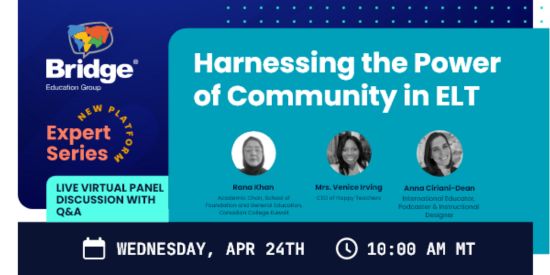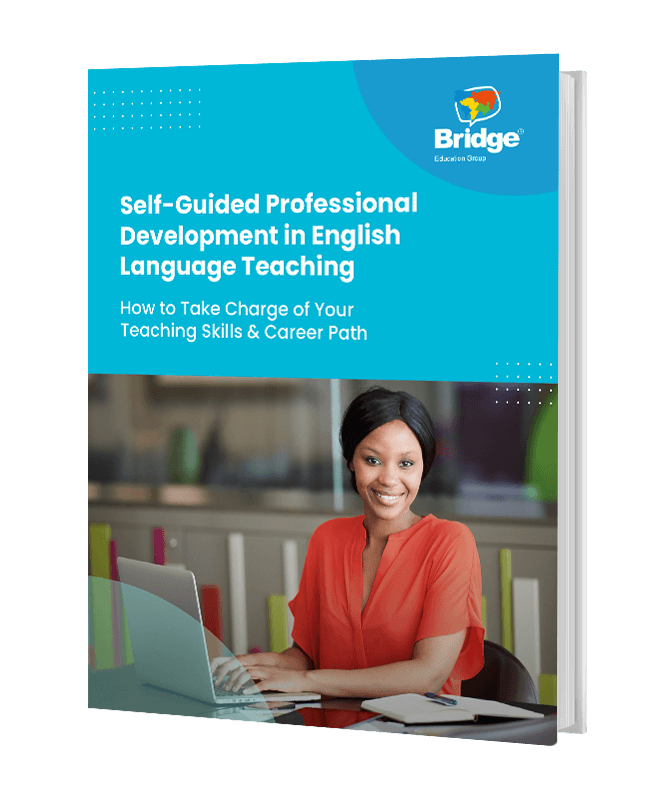Continued professional development (CPD) is useful in any industry and TEFL is no exception. Professional development refers to acquiring new skills through education and career training after joining the workforce. Teachers who invest in professional development will continue to grow in their profession, stay abreast of current trends, network with other English language professionals, and gain valuable skills and resources. Read on to find out how to make the most of professional development opportunities.
Read about nine ways to boost your resume with professional development.
1. Identify specific professional development goals
Whether professional development is through a course, webinar, workshop, or conference, you’ll gain the most from the experience if you first identify the professional development goals you’d like to achieve. Your goals may include things like improving your classroom management skills, learning new teaching techniques, or mastering new tech tools. In any case, identifying what you’d like to achieve through professional development will help you find learning opportunities that will help you meet those specific needs.
Some common professional development goals many teachers have include:
Finding effective teaching strategies for your ELT niche: If you teach in an ELT niche like Business English or English proficiency test preparation, you may be seeking professional development to meet the needs of your students better. Understanding their purpose in taking your course, their learning style, and new teaching techniques could help you identify a pedagogical strategy to improve your students’ engagement and learning outcomes. A goal like this might be met best with coursework aimed at gaining knowledge of teaching practices of the specific ELT niche. Taking a course like the Teaching Business English Specialized Certification or Teaching TOEFL Test Prep Micro-credential can help you identify resources and strategies to more effectively meet the needs of your students.
Integrating 21st-century teaching skills into your coursework: If you are looking for ways to teach your English students skills like collaboration, leadership, and digital literacy, you can focus your ELT professional development efforts on conferences, webinars, workshops, and courses that provide insights into strategies and resources you can use to teach these important skills to your students to prepare them for today’s workforce. Bridge’s suite of Micro-credentials in 21st-Century Teaching Skills provides strategies to modernize teaching skills and prepare learners for the future. Learn how to instill leadership and confidence in your students, promote critical thinking skills in your classroom, and other important modern skill sets.

Learning about new teaching methodologies and practices: Many different types of professional development focus on effective teaching methodologies. You can take TEFL courses, attend association events, and join webinars or workshops on ELT methods. Look for professional development opportunities that can expose you to new ideas, help you find connections between learning styles and effective teaching methods, and identify new ways to increase engagement. If you teach young learners or teenagers, courses like the Specialized Certificate in Teaching English to Young Learners and Teenagers will help deepen your understanding of the theories and principles related to second language acquisition to help you make informed decisions about the best teaching methods that will effectively facilitate language learning.
Building your assessment and feedback skills: Many teachers seek new ways to formally and informally assess their students’ learning. Looking for professional development that focuses on English language testing or strategies for informative assessment and effective feedback will help you learn new techniques, identify effective tools for assessment, and find helpful resources.
Mastering new tech tools: Technology is constantly changing, so this is a common professional development goal for many teachers. With advances in artificial intelligence, many teachers would like to learn how to create lesson plans using AI, ease their teacher workload by using AI teaching assistant technologies, and much more. Independent teachers also use technology to market their services, making videos and podcasts or leveraging social media. Attending workshops and webinars or taking courses focusing on specific technology goals can help build these needed skills.
Learning about the latest TEFL industry trends: Events like summits, conferences, and webinars can provide insights into evolving TEFL trends. The Bridge Expert Series webinars gather industry experts in round-table discussions to review the latest TEFL insights and trends, covering topics ranging from pedagogy to teaching English online. Engaging in professional development with this goal in mind helps teachers stay relevant and prepared to meet the needs of today’s students and employers.
Read about ways to take advantage of online professional development from global ELT associations.
Map out your unique career path with the free guide to
Self-Guided Professional Development in ELT
download2. Plan ahead, keeping track of upcoming ELT professional development opportunities
The field of ELT is constantly evolving, with new research findings, teaching methodologies, and technological advancements emerging regularly. Planning ahead for professional development opportunities helps you stay informed about the latest trends and developments in the field.
By planning ahead, you can identify specific professional development goals and select opportunities that align with your areas of interest, needs, and career aspirations. This strategic approach helps you make the most of your professional development experiences and maximize their impact on your teaching practice.
You can find ELT events online and around the globe using Bridge’s TEFL/TESOL Events Calendar. By checking it regularly, you can plan ahead to take advantage of ELT conferences, webinars, summits, conventions, and more. Bridge also offers information sessions to help both new and experienced teachers choose the next steps for them.
[tribe_events]
3. Make the most of online resources
Online opportunities offer flexibility and access to global networks and training. This means you can further your professional development from the comfort of your own home! It’s even possible to network with other English teachers online.
For example, the Bridge Expert Series webinars gather leading experts in the ELT industry to discuss current teaching methodologies, teaching tips and tools, industry trends, proficiency testing, and much more, providing insights and resources for a global audience of webinar participants. You can register to view the free live webinars or join the community to access over 75 on-demand webinars and earn certificates of professional development for each webinar you complete.
Blogs can also be a great online resource for ELT professional development. The BridgeUniverse blog has articles exploring topics like teaching English online, pedagogy, classroom games and activities, teaching English abroad, professional development, and more. Bridge has an abundance of articles dedicated to the various aspects of being an English teacher. You can stay current with global ELT news and industry insights or explore niche topics like how to empower your students with the flipped classroom approach.
Take advantage of online TEFL courses for professional development, or explore social media communities like the Online Teaching English Facebook Group and the TEFL/TESOL Jobs Facebook Group. Connect with a TEFL community to share ideas, advance your career, and find support!
Interested in learning more about Expert Series? Learn how to level up your professional development with Bridge Expert Series webinars.

4. Take the time to reflect on your learning
To make the most of your professional development courses, seminars, lectures, and events, it’s important to note that quality is more important than quantity. In effect, quality professional development offers opportunities to gain feedback on your teaching practice and ongoing support for implementing new strategies or approaches in the classroom.
You may have heard of reflective teaching, which can help you break out of the rut of teaching on autopilot. Reflective teaching can take on many forms, but some characteristics of reflective practices include:
-
making note of what happens in the classroom, why, and how it can be improved
-
engaging in self-critique
-
dialoguing with colleagues or a mentor
-
collaborating with other professionals
Similar practices can be employed with professional development learning. You may choose to take notes and then reflect on what you learned, what you found particularly interesting, any connections to your current teaching practices, and how you might employ new learning. You may take the time to consider your current teaching methods and practices, critiquing yourself and considering areas of potential growth. It’s also very helpful to have a dialogue about what you’ve learned with another participant or colleague. If you work in a school, you may find it beneficial to discuss what you learned and collaborate with others to integrate new practices, resources, or technologies that would benefit your classroom and your school.
Interested in learning more? Reflective teaching is covered in detail in the IDELTOnline™ course, Bridge’s most advanced professional TEFL certification, which can be used as a pathway to an MA in TESOL.
5. Prioritize networking and building a community of practice
Networking allows TEFL professionals to exchange teaching materials, lesson plans, and instructional strategies. By sharing resources and best practices, educators can benefit from each other’s expertise and experiences, ultimately enhancing the quality of their teaching.
This is especially advantageous if you’re looking to branch out as an independent online teacher, or teacherpreneur. Given that you’ll mostly be working on your own, networking helps build a sense of community and belonging among TEFL professionals. By connecting with like-minded educators who share similar passions and challenges, educators can feel supported, valued, and empowered in their teaching journey.
If you’re considering a career as an independent English language teacher, Teacherpreneur Academy could be the right fit for you. Academy members gain access to an exclusive platform for resource sharing, continuous learning, and direct engagement with expert-led workshops. Members also complete the Specialized Certification Succeeding as an English Teacherpreneur.
Engaging in continued professional development has many benefits for English language teachers. Make the most of your professional development experience by identifying your learning goals, keeping track of learning opportunities, taking advantage of online learning, reflecting on your learning, and building a network of other ELT professionals. There are many ways to learn and grow in your profession. Leverage the many resources available to you and you’ll find new motivation, fresh inspiration, and a global community of support!









